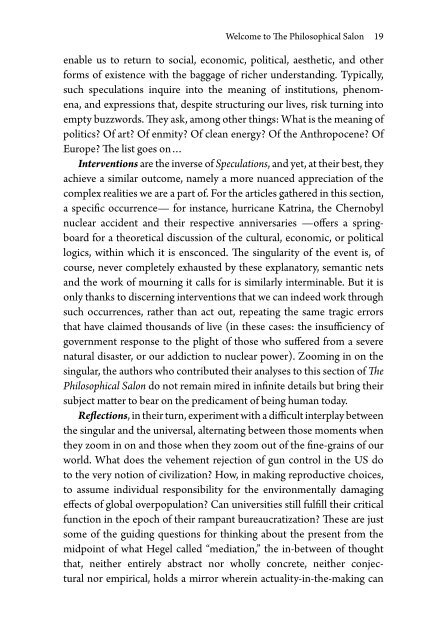The Philosophical Salon
Marder-Vieira_2017_The-Philosophical-Salon
Marder-Vieira_2017_The-Philosophical-Salon
Create successful ePaper yourself
Turn your PDF publications into a flip-book with our unique Google optimized e-Paper software.
Welcome to <strong>The</strong> <strong>Philosophical</strong> <strong>Salon</strong> 19<br />
enable us to return to social, economic, political, aesthetic, and other<br />
forms of existence with the baggage of richer understanding. Typically,<br />
such speculations inquire into the meaning of institutions, phenomena,<br />
and expressions that, despite structuring our lives, risk turning into<br />
empty buzzwords. <strong>The</strong>y ask, among other things: What is the meaning of<br />
politics? Of art? Of enmity? Of clean energy? Of the Anthropocene? Of<br />
Europe? <strong>The</strong> list goes on…<br />
Interventions are the inverse of Speculations, and yet, at their best, they<br />
achieve a similar outcome, namely a more nuanced appreciation of the<br />
complex realities we are a part of. For the articles gathered in this section,<br />
a specific occurrence— for instance, hurricane Katrina, the Chernobyl<br />
nuclear accident and their respective anniversaries —offers a springboard<br />
for a theoretical discussion of the cultural, economic, or political<br />
logics, within which it is ensconced. <strong>The</strong> singularity of the event is, of<br />
course, never completely exhausted by these explanatory, semantic nets<br />
and the work of mourning it calls for is similarly interminable. But it is<br />
only thanks to discerning interventions that we can indeed work through<br />
such occurrences, rather than act out, repeating the same tragic errors<br />
that have claimed thousands of live (in these cases: the insufficiency of<br />
government response to the plight of those who suffered from a severe<br />
natural disaster, or our addiction to nuclear power). Zooming in on the<br />
singular, the authors who contributed their analyses to this section of <strong>The</strong><br />
<strong>Philosophical</strong> <strong>Salon</strong> do not remain mired in infinite details but bring their<br />
subject matter to bear on the predicament of being human today.<br />
Reflections, in their turn, experiment with a difficult interplay between<br />
the singular and the universal, alternating between those moments when<br />
they zoom in on and those when they zoom out of the fine-grains of our<br />
world. What does the vehement rejection of gun control in the US do<br />
to the very notion of civilization? How, in making reproductive choices,<br />
to assume individual responsibility for the environmentally damaging<br />
effects of global overpopulation? Can universities still fulfill their critical<br />
function in the epoch of their rampant bureaucratization? <strong>The</strong>se are just<br />
some of the guiding questions for thinking about the present from the<br />
midpoint of what Hegel called “mediation,” the in-between of thought<br />
that, neither entirely abstract nor wholly concrete, neither conjectural<br />
nor empirical, holds a mirror wherein actuality-in-the-making can


